1046 start with F start with F
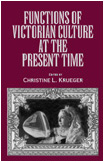
Functions of Victorian Culture at the Present Time addresses the theme of the Victorians' continuing legacy and its effect on our own culture and perception of the world. The contributors' diverse topics include the persistent influence of Jack the Ripper on police procedures, the enormous success of the magazine Victoria and the lifestyle it promotes, and film, television, and theatrical adaptations of Victorian texts.
Also addressed are appropriations of Oscar Wilde to market gay identity in contemporary advertising, and appeals to the Victorian empire in constructing the 'New Britain' for the era of globalization. Functions of Victorian Culture at the Present Time encourages a critique of how these artifacts contribute to contemporary culture and confronts the challenges of disseminating the older culture in the new millennium.
The contributors include Simon Joyce, Ronald R. Thomas, Miriam Bailin, Ellen Bayuk Rosenman, Jesse Matz, Sharon Aronofsky Weltman, Kathleen Lonsdale, Christine L. Krueger, Florence Boos, David Barndollar, Susan Schorn, and Sue Lonoff.
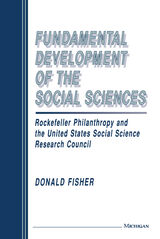
The United States Social Science Research Council (SSRC), founded in 1923, was the first national social science institution in the world and might be said to represent the creation of a "science of society." In Fundamental Development of the Social Sciences , Donald Fisher shows how this institution, under the considerable influence of Rockefeller philanthropy, shaped an entire discipline.
Fisher demonstrates that the creation and growth of the SSRC during the 1920s and 1930s is essential to our understanding of the major developments in the social sciences since World War II. He shows that during this period, the place of social science and social scientists in American society was fixed in a way that has had substantial, lasting impact.
The author weaves a number of larger, related issues into his account of the wide-ranging influence of the SSRC: the role of social scientists in the political life of the societies in which they live; the way in which knowledge systems develop and change; the role of philanthropy in industrialized societies; and the formation and preservation of the modern capitalist state.
Donald Fisher's discussion of how an American institution sculpted an entire discipline will be of interest to all social scientists and historians of social science.
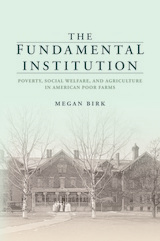
In-depth and innovative, The Fundamental Institution offers an overdue portrait of rural social welfare in the United States.








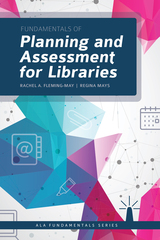
The concepts of planning and assessment are intrinsically linked—and understanding them is essential for raising the library’s profile and strengthening its position among stakeholders and the community. Even if you're an LIS student or are new to the profession, or if planning or assessment are not your primary areas of responsibility, you still have a role to play in the success of organizational efforts. Fleming-May has more than a decade of experience in planning and assessment initiatives and instruction, and Mays was her institution’s first assessment librarian; their primer draws from theory, research, and their first-hand observations to illuminate such topics as
- characteristics of bad planning strategy that can help to illustrate a better approach;
- reasons why using economic models, like ROI, fall short;
- how to mix the three types of planning;
- guidelines to ensure that assessment is meaningful and actionable;
- tips for creating effective surveys;
- emphasizing users’ needs with a critical assessment framework;
- data analysis for surveys, interviews, focus groups, and observation;
- four questions to ask about audience level before you develop a report;
- a sample 3-year assessment plan that can be customized; and
- seven steps for developing a culture of ongoing assessment.



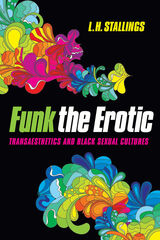
Stallings uses funk to highlight the importance of the erotic and eroticism in Black cultural and political movements, debunking "the truth of sex" and its histories. Brandishing funk as a theoretical tool, Stallings argues that Western theories of the erotic fail as universally applicable terms or philosophies, and thus lack utility in discussions of black bodies, subjects, and culture. In considering the Victorian concept of freak in black funk, Stallings proposes that black artists across all media have fashioned a tradition that embraces the superfreak, sexual guerrilla, sexual magic, mama's porn, black trans narratives, and sex work in a post-human subject position. Their goal: to ensure survival and evolution in a world that exploits black bodies in capitalist endeavors, imperialism, and colonization.
Revitalizing and wide-ranging, Funk the Erotic offers a needed examination of black sexual cultures, a discursive evolution of black ideas about eroticism, a critique of work society, a reexamination of love, and an articulation of the body in black movements.

"The most sensational, perpetual teenager in the world.” —Jim Henson
"To know him was to love him, and we do." —Mark Hamill
Funny Boy: The Richard Hunt Biography tells the life story of a gifted performer whose gleeful irreverence, sharp wit and generous spirit inspired millions. Richard Hunt was one of the original main five performers in the Muppet troupe. He brought to life an impressive range of characters on The Muppet Show, Sesame Street, Fraggle Rock and various Muppet movies, everyone from eager gofer Scooter to elderly heckler Statler, groovy girl Janice to freaked-out lab helper Beaker, even early versions of Miss Piggy and Elmo. Hunt also acted, directed and mentored the next generation of performers. His accomplishments are all the more remarkable in that he crammed them all into only 40 years.
Richard Hunt was just 18 years old when he joined Jim Henson’s company, where his edgy humor quickly helped launch the Muppets into international stardom. Hunt lived large, savoring life’s delights, amassing a vivid, disparate community of friends. Even when the AIDS epidemic wrought its devastation, claiming the love of Hunt’s life and threatening his own life, he showed an extraordinary sense of resilience, openness and joy. Hunt’s story exemplifies how to follow your passion, foster your talents, adapt to life’s surprises, genuinely connect with everyone from glitzy celebrities to gruff cab drivers – and have a hell of a lot of fun along the way.
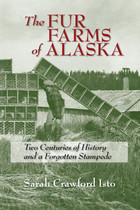
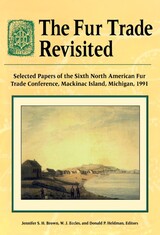

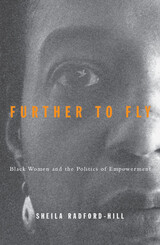
How feminism has failed African American women and why they must fight back.
Amid the longest-running economic boom in American history and despite the emergence of a significant black middle class, the lot of low-income black people in general-and black women in particular-seems more troubling than ever. Their plight, Sheila Radford-Hill argues in this book, is directly related to the diminution of black women’s traditional power as culture bearers and community builders. A cogent critique of feminist theory and practice, Further to Fly identifies the failure of feminism to connect with the social realities it should seek to explain, in particular the decline of black women’s empowerment.
Further to Fly searches out the causes and effects of this decline, describing the ways in which, since the 1960s, black women have been stripped of their traditional status as agents of change in the community-and how, as a result, the black community has faltered. Radford-Hill explores the shortcomings of second-wave black and white feminism, revealing how their theoretical underpinnings have had unintended (and often unacknowledged) negative consequences for black women’s lives and their communities.While acknowledging that African American women have made significant contributions to the black struggle for justice in America, Radford-Hill argues that more needs to be done. She combines social criticism and critical analysis to argue that black women must revive their legacy of activism and reclaim the tradition of nurturing in the black community, proposing specific tactics that can be used to revive the support networks that help determine the obligations of community members and guide how people interact on an everyday level. As a deft account of genesis and effects of black women’s diminishing power, and as a sobering analysis of the devastating blunders of feminist theory and practice, this work makes a compelling argument for an "authentic feminism," one that aggressively connects the realities of women’s experiences, needs, aspirations, and responsibilities.
The 2015 Affirmatively Furthering Fair Housing Rule was the most significant federal effort to increase equality of access to place-based resources and opportunities, such as high-performing schools or access to jobs, since the 1968 Fair Housing Act. However, in an effort to appeal to suburban voters, the Trump administration repealed the rule in 2020, leaving its future in doubt.
Furthering Fair Housing analyzes multiple dimensions of this rule, identifying failures of past efforts to increase housing choice, exploring how the AFFH Rule was crafted, measuring the initial effects of the rule before its rescission, and examining its interaction with other contemporary housing issues, such as affordability, gentrification, anti-displacement, and zoning policies.
The editors and contributors to this volume—a mix of civil rights advocates, policymakers, and public officials—provide critical perspectives and identify promising new directions for future policies and practices. Placing the history of fair housing in the context of the centuries-long struggle for racial equity, Furthering Fair Housing shows how this policy can be revived and enhanced to advance racial equity in America’s neighborhoods.
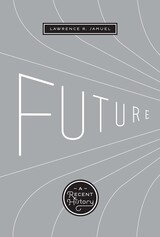
The future is not a fixed idea but a highly variable one that reflects the values of those who are imagining it. By studying the ways that visionaries imagined the future—particularly that of America—in the past century, much can be learned about the cultural dynamics of the time.
In this social history, Lawrence R. Samuel examines the future visions of intellectuals, artists, scientists, businesspeople, and others to tell a chronological story about the history of the future in the past century. He defines six separate eras of future narratives from 1920 to the present day, and argues that the milestones reached during these years—especially related to air and space travel, atomic and nuclear weapons, the women's and civil rights movements, and the advent of biological and genetic engineering—sparked the possibilities of tomorrow in the public's imagination, and helped make the twentieth century the first century to be significantly more about the future than the past.
The idea of the future grew both in volume and importance as it rode the technological wave into the new millennium, and the author tracks the process by which most people, to some degree, have now become futurists as the need to anticipate tomorrow accelerates.

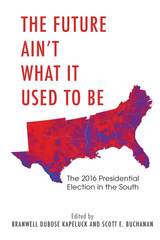
The Future Ain’t What It Used to Be details how the 2016 presidential election developed in the eleven states that make up the South. Preeminent scholars of Southern politics analyze this momentous election, including the issues that drove southern voters, the nomination process in early 2016, and where the region may be headed politically in the Trump era. In addition, each state chapter includes analysis on notable congressional races and important patterns within the states.
This new edited volume will be an important tool for scholars, and also journalists and political enthusiasts seeking a deeper understanding of contemporary southern electoral politics.
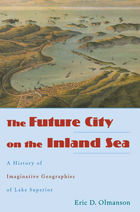

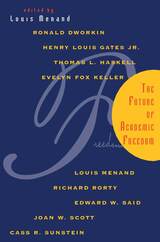
"Louis Menand has assembled The Future of Academic Freedom to better define and delineate what should and should not happen within our colleges and universities. . . . The whole extremely learned yet accessible debate exploits the freedoms it extols, tackling sensitive subjects such as ethnicity and ethics head-on."—Publishers Weekly
"The essays are not only sharp, elegant and lucid, but extremely well-informed about the history of American battles over academic freedom."—Alan Ryan, Times Higher Education Supplement
"[A] superb inquiry into some of the most vexing and significant issues in higher education today."—Zachary Karabell, Boston Book Review
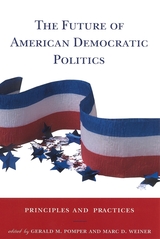
In this book, fifteen major scholars assess the current state of American democracy, offering a spirited dialogue on the future of democratic politics. Contributors focus on three principles fundamental to democracyequality, liberty, and participation. They examine these principles within the context of the basic institutions of American democracy: Congress and the state legislatures, the president, political parties, interest groups, and the Supreme Court. They raise questions regarding the checks and balances among formal governmental institutions as well as the role of political parties and interest groups.
Topics discussed include the incomplete mobilization of the electorate, the debates over campaign finance reform and term limits, the Supreme Courts activist role in the Florida recount, the dangers of teledemocracy and state initiatives, the separation of political participation from residential location, "identity politics," the clash of "negative" and "positive" liberty, and the prospects for personal freedom in an era of terrorist threats.
This timely collection covers the issues relevant to the future of American democracy today not only for lawmakers, students, and historians, but for any concerned citizen.

An eye-opening account of how the information gap in business journalism is eroding civic life and impacting the economy––and how we can fix it
Business owners, consumers, and employees have long relied on the news to make financial decisions—what to buy, who to hire, and what products to sell. In the twenty-first century, that news has shifted. Only the big businesses and executives can afford expensive subscriptions, while most consumers and small business owners are left scrambling to find the news they need to succeed and thrive. The Future of Business Journalism explores how the field evolved into this divide and offers solutions on how business journalism can once again provide the stories and content that a broad society needs.
In The Future of Business Journalism, veteran business journalist and professor Chris Roush explains the causes, reveals the consequences, and offers potential solutions to this pressing problem. Roush delves into how the crisis occurred, from the disintegration of the once-strong relationship between businesses and media to the media’s focus on national coverage at the expense of local news. He reveals how these trends result in major “coverage deserts.”
Roush’s proposal for a way forward shows how businesses, journalists, and media can work together to support the economic and financial literacy needed for an informed citizenry. He recommends that media organizations take advantage of technological innovations to provide better business news content, suggests that journalism programs require budding reporters to take more business courses, and encourages businesses to fund journalism school programs. This insightful overview of the current state of business journalism reveals its strengths and weaknesses and shows how Main Street can regain access to the news it needs.

Lisa Steinberg. Elisa Izquierdo. Lance Helms. These are just a few of the names drawn from recent headlines, revealing cases of horrendous child abuse and neglect. Such cases have led to a crisis of confidence in the current child protective services (CPS) system, and to frequent calls for reform.
The public is right to be concerned, shows Jane Waldfogel, but many perceptions of the CPS system and the problems it is designed to alleviate are inaccurate. This book goes beyond the headlines, using historical, comparative, and specific case data to formulate a new approach to protecting children.
Currently, Waldfogel argues, the CPS system is overwhelmed by referrals. As a result, neither high-risk nor low-risk families are adequately served.
Waldfogel examines the underlying assumptions of CPS, compares the U.S. record with those of Britain, Canada, and Australia, and offers a "new paradigm" in which CPS joins with other public and private partners to provide a differential response to the broad range of children in need of protection. She highlights reforms underway in several states and in Britain.
This book's analytical clarity and straightforward policy recommendations will make it mandatory reading for policymakers, practitioners, and others interested in the future of child protection.
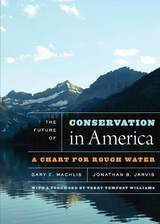
Written by the first scientist appointed as science advisor to the director of the National Park Service and the eighteenth director of the National Park Service, this is a candid, passionate, and ultimately hopeful book. The authors describe a unified vision of conservation that binds nature protection, historical preservation, sustainability, public health, civil rights and social justice, and science into common cause—and offer real-world strategies for progress. To be read, pondered, debated, and often revisited, The Future of Conservation in America is destined to be a touchstone for the conservation movement in the decades ahead.
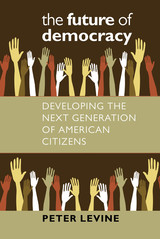

Are NATO’s mutual security commitments strong enough today to deter all adversaries? Is the nuclear umbrella as credible as it was during the Cold War? Backed by the full range of US and allied military capabilities, NATO’s mutual defense treaty has been enormously successful, but today’s commitments are strained by military budget cuts and antinuclear sentiment. The United States has also shifted its focus away from European security during the wars in Afghanistan and Iraq and more recently with the Asia rebalance. Will a resurgent Russia change this?
The Future of Extended Deterrence brings together experts and scholars from the policy and academic worlds to provide a theoretically rich and detailed analysis of post–Cold War nuclear weapons policy, nuclear deterrence, alliance commitments, nonproliferation, and missile defense in NATO but with implications far beyond. The contributors analyze not only American policy and ideas but also the ways NATO members interpret their own continued political and strategic role in the alliance.
In-depth and multifaceted, The Future of Extended Deterrence is an essential resource for policy practitioners and scholars of nuclear deterrence, arms control, missile defense, and the NATO alliance.

Americans are understandably concerned about the runaway costs of medical care and the fact that one citizen out of seven is without health insurance coverage. Solving these problems is a top priority for the Clinton administration, but as Victor Fuchs shows, the task is enormously complex. In this book Fuchs, America's foremost health economist, provides the reader with the necessary concepts, facts, and analyses to comprehend the complicated issues of health policy. He shows why health care reform that benefits society as a whole will unavoidably burden certain individuals and groups.
Fuchs addresses such central questions as cost containment, managed competition, technology assessment, poverty and health, children's health, and national health insurance. The future of U.S. health policy, he argues, is tightly linked to three basic questions; First, how can we disengage health insurance from employment? Second, how can we tame technological change in health care? And finally how can we cope with the runaway medical costs of an aging society?
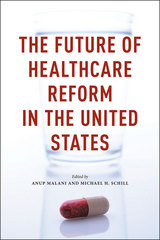
In the years since the passage of the Patient Protection and Affordable Care Act (PPACA, or, colloquially, Obamacare), most of the discussion about it has been political. But as the politics fade and the law's many complex provisions take effect, a much more interesting question begins to emerge: How will the law affect the American health care regime in the coming years and decades?
This book brings together fourteen leading scholars from the fields of law, economics, medicine, and public health to answer that question. Taking discipline-specific views, they offer their analyses and predictions for the future of health care reform. By turns thought-provoking, counterintuitive, and even contradictory, the essays together cover the landscape of positions on the PPACA's prospects. Some see efficiency growth and moderating prices; others fear a strangling bureaucracy and spiraling costs. The result is a deeply informed, richly substantive discussion that will trouble settled positions and lay the groundwork for analysis and assessment as the law's effects begin to become clear.
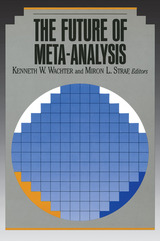

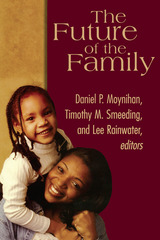

In this passionate and challenging book, a distinguished historian of Zionism argues that the world of Jewry is coming apart, that the old reality of Jewish nationhood lies shattered, that Israel is increasingly isolated, fated to go its separate way disengaged from Jewish communities in the Diaspora—most especially the Jewish community in the United States.
David Vital traces the roots of this disarray to the revolution—still unfinished—that began with the emancipation of the Jews in France after the Revolution, continued with the movement of Jews out of Europe and the decimation of European Jewry in the Holocaust, and culminated in the establishment of the state of Israel. For the first time in centuries the Jews have emerged as actors in history, with a nation-state of their own, but the political interests of Jews in Israel and of Jews in the Diaspora appear to be irreparably divided. The Jews are no longer a cohesive people, Vital claims; contemporary Jewry is profoundly fractured and dysfunctional, a fact that is nowhere more apparent than in the growing gap between the two largest Jewish communities in the world, the ones in Israel and in the United States.
This incisive book describes the waning of the Jewish nation, in an effort to lay the groundwork for a cool, clear, and more hardheaded view of the future of the Jews. Anyone with a serious interest in contemporary politics, and in the history and problematics of the Jews and Judaism, will find much to consider in this gripping book.

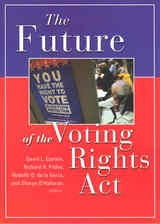
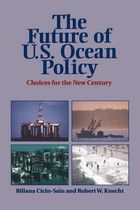
The United States is about to embark on the most thorough reconsideration of its ocean policy in more than three decades. With 1998 designated as the International Year of the Ocean by the United Nations, and with both the executive branch and the Congress currently working toward developing new approaches to formulating and implementing ocean policy, a comprehensive overview of key issues and concerns is essential.
The Future of U.S. Ocean Policy provides such an overview, with an in-depth analysis of the evolution of U.S. ocean policy and a timely discussion of the most important ocean and coastal issues facing the nation. The book assesses the current status of ocean policy, examines national and international trends, and considers choices for policymakers in the 21st century. Following an introductory chapter that reviews national ocean policy and the process by which it is made, the authors:
- review the history of development of U.S. ocean and coastal policy
- examine the major ocean laws enacted in the 1970s and review and assess their record of implementation
- examine factors that will affect U.S. ocean policy in the coming decade
- discuss the need to make policy more coherent, and to develop institutional mechanisms that can foster more effective guidance and oversight
- present a set of policy options for improving U.S. ocean policy
The Future of U.S. Ocean Policy is the only recent book that focuses on national ocean policy in its entirety, and will play an important role in upcoming debates concerning the future direction of policy initiatives. Agency personnel, members and staff of nongovernmental organizations, industry groups, Congressional staffers, state and local government officials, academics, and concerned citizens will find the book an invaluable guide, as will students and faculty in courses in marine and coastal management and in environmental management.

Selected contributors. Dahlak Brathwaite, adrienne maree brown, Jeff Chang, Tameca Cole, Ofelia Esparza, Antoine Hunter, Nobuko Miyamoto, Wendy Red Star, Spel, Jose Antonio Vargas, Carrie Mae Weems, Hinaleimoana Kwai Kong Wong-Kalu
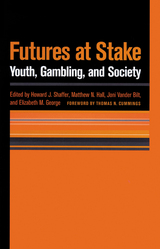
The widespread legalization of gambling across the U.S. has produced concerns for serious social, economic, and health problems. For the first time in this country, an entire generation of young people has reached adulthood within a context of approval and endorsement of gambling as a source of entertainment and recreation. Compared with their adult counterparts, these young people have evidenced a higher level of gambling related problems. In Futures at Stake, specialists in psychology, medicine, law, public health, economics, casino management, psychiatry, and criminal justice examine this problem from the perspective of their various disciplines, producing an intelligent, thought-provoking, and valuable survey of what is fast becoming a leading social-health problem across the nation. Foreword by Thomas N. Cummings.
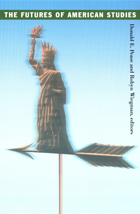
Contributors. Lindon Barrett, Nancy Bentley, Gillian Brown, Russ Castronovo, Eric Cheyfitz, Michael Denning, Winfried Fluck, Carl Gutierrez-Jones, Dana Heller, Amy Kaplan, Paul Lauter, Günter H. Lenz, George Lipsitz, Lisa Lowe, Walter Benn Michaels, José Estaban Muñoz, Dana D. Nelson, Ricardo L. Ortiz, Janice Radway, John Carlos Rowe, William V. Spanos
READERS
Browse our collection.
PUBLISHERS
See BiblioVault's publisher services.
STUDENT SERVICES
Files for college accessibility offices.
UChicago Accessibility Resources
home | accessibility | search | about | contact us
BiblioVault ® 2001 - 2024
The University of Chicago Press









